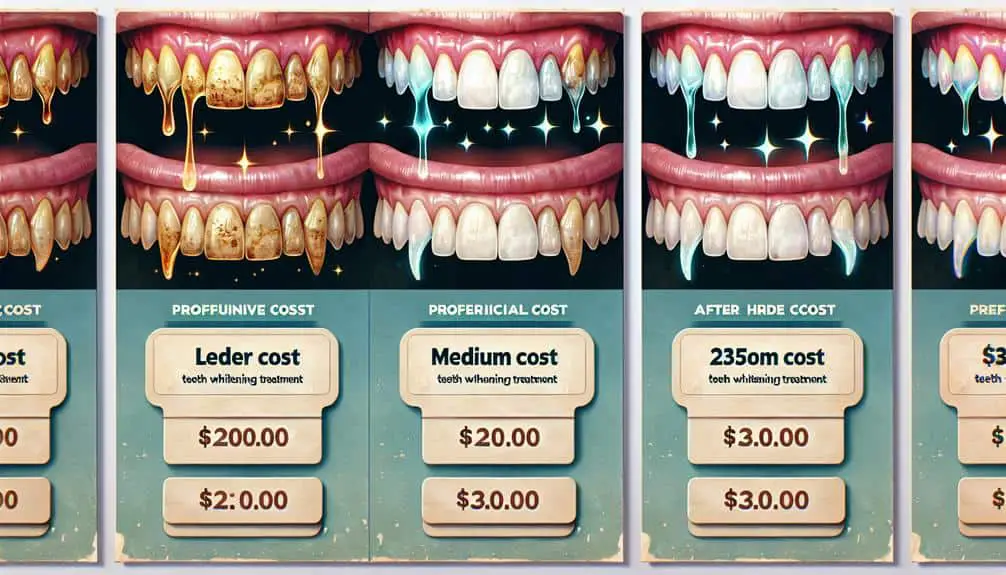For gentle teeth whitening options that are sensitive teeth approved, opt for gel formulas with enamel protection and desensitizing agents like potassium nitrate or fluoride. Prioritize your comfort and dental health by choosing products that won't cause discomfort. Achieve a brighter smile without pain by following these tips and considering professional treatments with high-concentration bleaching agents for best results. Embrace enamel-safe products for a brighter smile with ease.
Key Points
- Choose whitening products with enamel protection for sensitivity.
- Opt for gentle gel formulas to avoid tooth discomfort.
- Look for desensitizing agents like potassium nitrate.
- Consider natural remedies like saltwater rinses for sensitive teeth.
- Follow professional recommendations for safe and effective whitening treatments.
Causes of Tooth Sensitivity
If you experience tooth sensitivity, it may be helpful to understand the various causes that can contribute to this discomfort. Common triggers for tooth sensitivity include enamel erosion from acidic foods or drinks, brushing too vigorously with a hard-bristled toothbrush, gum recession exposing the sensitive tooth roots, and teeth grinding which can wear down enamel. Additionally, cavities, cracked teeth, and dental procedures like teeth whitening can also lead to sensitivity.
Prevention methods are essential in managing tooth sensitivity. Using a soft-bristled toothbrush and gentle brushing techniques can help prevent enamel erosion. Avoiding acidic foods and drinks, as well as using a mouthguard at night if you grind your teeth, can also mitigate sensitivity. Regular dental check-ups are vital to catch issues like cavities early on. Desensitizing toothpaste containing ingredients like potassium nitrate can help reduce sensitivity over time. By being mindful of these common triggers and implementing preventive measures, you can better manage tooth sensitivity and improve your overall oral health.
Best Whitening Products for Sensitivity
When selecting the best whitening products for sensitivity, consider opting for gentle formulations specifically designed to minimize discomfort and provide effective results. Sensitivity can make traditional whitening products challenging to use, but with the right choices, you can achieve a brighter smile without the pain.
Here are three top whitening products that prioritize your comfort and dental health:
- Gentle Gel Formula: Look for whitening products that feature a gentle gel formula. These gels are milder on sensitive teeth while still effectively removing stains to brighten your smile.
- Enamel Protection: Choose products that offer enamel protection. Sensitivity often coincides with weakened enamel, so opting for a whitening product that strengthens and protects the enamel can help maintain the health of your teeth.
- Desensitizing Agents: Some whitening products include desensitizing agents like potassium nitrate or fluoride. These ingredients help to reduce sensitivity during and after the whitening process, allowing you to achieve a whiter smile comfortably.
Tips for Whitening Sensitive Teeth
Consider incorporating these practical tips for whitening sensitive teeth effectively while prioritizing your comfort and dental health.
When dealing with sensitive teeth, it's vital to opt for gentle techniques to avoid aggravating any existing discomfort. One effective solution is to use a toothpaste specifically designed for sensitive teeth, as these are formulated to be milder while still aiding in whitening.
Additionally, consider whitening strips that are specifically made for sensitive teeth, as they're usually gentler than traditional whitening strips. It's important to follow the instructions carefully to prevent overuse, which could lead to increased sensitivity.
Another tip is to avoid foods and drinks that are known to stain teeth, such as coffee, tea, and red wine. Maintaining good oral hygiene practices, like regular brushing and flossing, can also help prevent further discoloration.
Professional Whitening Treatments
To enhance the brightness of your smile effectively, professional whitening treatments offer a reliable solution that can provide noticeable results. When considering professional whitening options, here are some key points to keep in mind:
- In-Office Treatments: Dentists use high-concentration bleaching agents that can whiten your teeth several shades in just one visit. This method is quick and effective for those looking for immediate results.
- Customized Whitening Trays: Some dental offices offer custom-made trays that fit your teeth perfectly. These trays are filled with a professional-grade whitening gel that you can use at home. This method allows for a more controlled and even whitening process.
- Combination Treatments: Dentists may recommend a combination of in-office treatments and at-home kits for the best results. This approach guarantees that your teeth achieve the desired shade while also considering preventive measures and aftercare tips to maintain your bright smile.
Professional whitening treatments provide a safe and effective way to whiten your teeth, offering an advantage over alternative methods or at-home kits. Remember to follow your dentist's recommendations for preventive measures and aftercare tips to prolong the effects of the whitening treatment.
Natural Remedies for Sensitive Teeth
Natural remedies can provide gentle solutions for individuals with sensitive teeth, offering relief and comfort without harsh chemicals or treatments.
Herbal alternatives can be a soothing option for those looking to alleviate tooth sensitivity. For example, rinsing your mouth with a chamomile tea solution can help reduce inflammation and calm nerve endings in the teeth.
Another herbal remedy is a clove oil compress. Clove oil has natural numbing properties that can help with tooth sensitivity.
DIY solutions like saltwater rinses can also be effective in desensitizing teeth. Mix warm water with salt and swish it around in your mouth for a minute or two. This can help reduce pain and discomfort associated with sensitive teeth.
Additionally, a paste made from baking soda and water can gently scrub away plaque and stains without causing further sensitivity. These natural remedies offer a gentle approach to managing sensitive teeth, providing relief without harsh chemicals.
Frequently Asked Questions
Can Teeth Whitening Cause Further Sensitivity in Already Sensitive Teeth?
When whitening sensitive teeth, choose gentle options to manage sensitivity. Techniques like desensitizing toothpaste, shorter whitening sessions, and avoiding extreme temperatures can help prevent discomfort. Prioritize sensitivity management to safeguard your dental health.
Are There Any Specific Foods or Drinks to Avoid After Whitening Sensitive Teeth?
After whitening sensitive teeth, avoid acidic foods like citrus fruits and drinks such as coffee and red wine. Opt for white meats, dairy, and water instead. Use desensitizing toothpaste and fluoride mouthwash to prevent sensitivity.
How Long Does the Whitening Effect Last on Sensitive Teeth Compared to Regular Teeth?
When it comes to the longevity of whitening effects, sensitive teeth may need more TLC. The impact of sensitivity can affect how long your pearly whites stay bright. Regular touch-ups and gentle maintenance can help extend the duration.
Are There Any Age Restrictions or Limitations for Using Gentle Teeth Whitening Options for Sensitive Teeth?
When considering age restrictions or limitations for gentle teeth whitening options for sensitive teeth, it's important to prioritize tooth sensitivity. Always consult with a dental professional to determine the best practices for your individual situation.
Can Using Whitening Toothpaste Regularly Help With Sensitivity in Addition to Whitening Effects?
Regular use of whitening toothpaste can aid in sensitivity management while providing whitening benefits. Look for ingredients like potassium nitrate or stannous fluoride for sensitivity relief. Remember, consistency in brushing is essential for best results.



